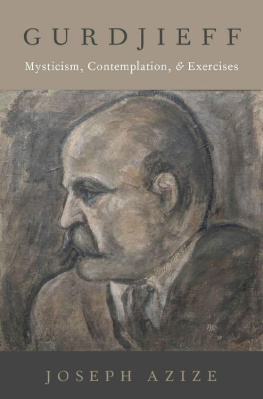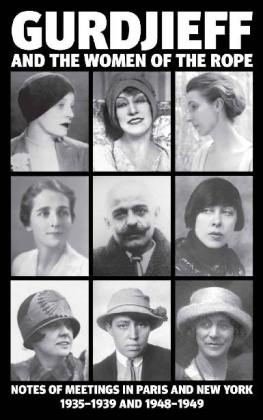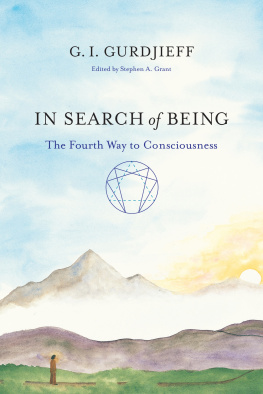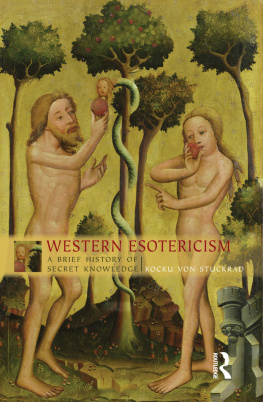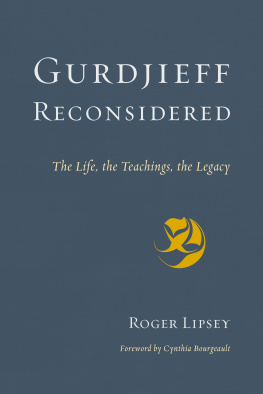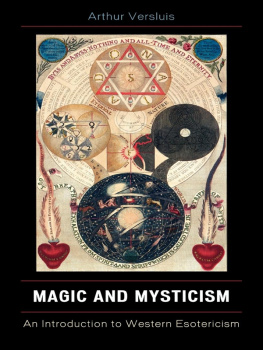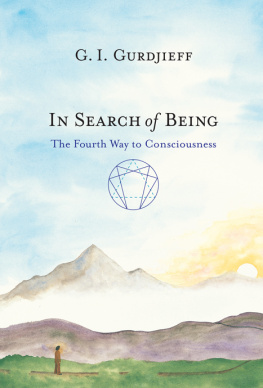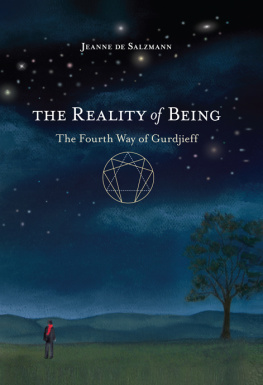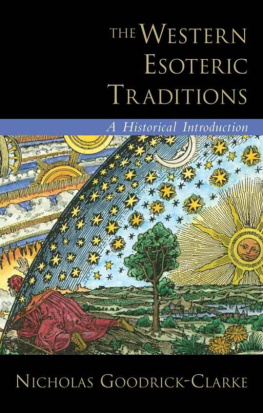Joseph Azize - Gurdjieff (Oxford Studies in Western Esotericism)
Here you can read online Joseph Azize - Gurdjieff (Oxford Studies in Western Esotericism) full text of the book (entire story) in english for free. Download pdf and epub, get meaning, cover and reviews about this ebook. year: 2019, publisher: Oxford University Press, genre: Religion. Description of the work, (preface) as well as reviews are available. Best literature library LitArk.com created for fans of good reading and offers a wide selection of genres:
Romance novel
Science fiction
Adventure
Detective
Science
History
Home and family
Prose
Art
Politics
Computer
Non-fiction
Religion
Business
Children
Humor
Choose a favorite category and find really read worthwhile books. Enjoy immersion in the world of imagination, feel the emotions of the characters or learn something new for yourself, make an fascinating discovery.
- Book:Gurdjieff (Oxford Studies in Western Esotericism)
- Author:
- Publisher:Oxford University Press
- Genre:
- Year:2019
- Rating:5 / 5
- Favourites:Add to favourites
- Your mark:
- 100
- 1
- 2
- 3
- 4
- 5
Gurdjieff (Oxford Studies in Western Esotericism): summary, description and annotation
We offer to read an annotation, description, summary or preface (depends on what the author of the book "Gurdjieff (Oxford Studies in Western Esotericism)" wrote himself). If you haven't found the necessary information about the book — write in the comments, we will try to find it.
Gurdjieff (Oxford Studies in Western Esotericism) — read online for free the complete book (whole text) full work
Below is the text of the book, divided by pages. System saving the place of the last page read, allows you to conveniently read the book "Gurdjieff (Oxford Studies in Western Esotericism)" online for free, without having to search again every time where you left off. Put a bookmark, and you can go to the page where you finished reading at any time.
Font size:
Interval:
Bookmark:
Series Editor
Henrik Bogdan, University of Gothenburg
Editorial Board
Jean-Pierre Brach, cole Pratique des Hautes tudes
Carole Cusack, University of Sydney
Christine Ferguson, University of Stirling
Olav Hammer, University of Southern Denmark
Wouter Hanegraaff, University of Amsterdam
Ronald Hutton, University of Bristol
Jeffrey Kripal, Rice University
James R. Lewis, University of Troms
Michael Stausberg, University of Bergen
Egil Asprem, University of Stockholm
Dylan Burns, Freie Universitt Berlin
Gordan Djurdjevic, Siimon Fraser University
Peter Forshaw, University of Amsterdam
Jesper Aa. Petersen, Norwegian University of Science and Technology
CHILDREN OF LUCIFER
The Origins of Modern Religious Satanism
Ruben van Luijk
SATANIC FEMINISM
Lucifer as the Liberator of Woman in Nineteenth-Century Culture
Per Faxneld
THE SIBLYS OF LONDON
A Family on the Esoteric Fringes of Gregorian England
Susan Sommers
WHAT IS IT LIKE TO BE DEAD?
Near-Death Experiences, Christianity, and the Occult
Jens Schlieter
AMONG THE SCIENTOLOGISTS
History, Theology, and Praxis
Donald A. Westbrook
RECYCLED LIVES
A History of Reincarnation in Blavatskys Theosophy
Julie Chajes
THE ELOQUENT BLOOD
The Goddess Babalon and the Construction of Femininities in Western Esotericism
Manon Hedenborg-White
GURDJIEFF
Mysticism, Contemplation, and Exercises
Joseph Azize
JOSEPH AZIZE


Oxford University Press is a department of the University of Oxford. It furthers the Universitys objective of excellence in research, scholarship, and education by publishing worldwide. Oxford is a registered trade mark of Oxford University Press in the UK and certain other countries.
Published in the United States of America by Oxford University Press
198 Madison Avenue, New York, NY 10016, United States of America.
Oxford University Press 2020
All rights reserved. No part of this publication may be reproduced, stored in a retrieval system, or transmitted, in any form or by any means, without the prior permission in writing of Oxford University Press, or as expressly permitted by law, by license, or under terms agreed with the appropriate reproduction rights organization. Inquiries concerning reproduction outside the scope of the above should be sent to the Rights Department, Oxford University Press, at the address above.
You must not circulate this work in any other form and you must impose this same condition on any acquirer.
CIP data is on file at the Library of Congress
ISBN 9780190064075
eISBN 9780190064099
To George and Helen Adie, this, my simple homage.
This is compatible with understanding Gurdjieffs teaching as a technique for spiritual advancement that might be utilized in a range of contexts, and by people with varying or no religious beliefs or affiliations. In fact, the terms used to describe Gurdjieff during his life included charlatan and magician but in general did not connect him to religion, and more recent designators like spiritual teacher and Western esotericist had not yet come into vogue. It is therefore not surprising that the academic study of Gurdjieff has emerged only recently, and that it is situated in a range of disciplines including religious studies, psychology, and Western esotericism, reflecting both the protean quality of the Work or the Fourth Way, and the conflicting and contested ways that Gurdjieff himself has been portrayed.
The earliest writings about Gurdjieff, as noted above, were by critical journalists, and these were supplemented by a body of early devotional literature authored by close pupils. These works included expositions of Gurdjieffs ideas such as P. D.
Since the 1960s the dominant Christian religion of the Western world has been in retreat, and a deregulated religious and spiritual marketplace has provided a range of alternatives for seekers. Gurdjieff; Helena Petrovna Blavatsky (18311891), co-founder of Theosophy; and his near-contemporary Rudolf Steiner (18611925), the founder of Anthroposophy, have been cast as founding figures of the so-called New Age.
The beginnings of the academic study of Gurdjieff were visible in the 1990s, with publication of some insider-oriented volumes with mainstream scholarly publishers. For example,
The development of the academic field of (Western) Esotericism is temporally linked to this emergence of scholarly studies of Gurdjieff. The most substantial outcome is Johanna Petsches monograph Gurdjieff and Music: The Gurdjieff/de Hartmann Piano Music and its Esoteric Significance (2015), which was published by Brill and has been well received.
This historical sketch of writing, reading, researching, practicing, and publishing about or as part of the Gurdjieff tradition establishes the context for Gurdjieff: Mysticism, Contemplation, and Exercises, a book that makes a major contribution to scholarship in a number of areas. It has been commonplace to claim various origins or sources of Gurdjieffs teachings over the years: In his lectures he often spoke of Christianity, Sufism, Buddhism, Hinduism, and various other religious and initiatory traditions, and sundry pupils became focused on seeking the mysterious Sarmoung Brotherhood that featured in Meetings with Remarkable Men, most notably Bennett, who was convinced that the Work originated in Sufism. This view has been promoted in two monographs, Anna T. Challengers Philosophy and Art in Gurdjieffs Beelzebub: A Modern Sufi
Situating Gurdjieff in the context of the history of mysticism creates space for discussion of the exercises that have been neglected to date for a range of reasons, chiefly the perception among Gurdjieff groups of all types and lineages that the exercises were secret, and the fact that they have almost entirely been discontinued among Foundation members.from him, as did Athena from the head of Zeus, he demonstrates that the early teaching in Russia and the Caucasus was characterized by the exposition of an elaborate cosmology and the use of physical techniques like the Movements and the Stop Exercise, while the 1920s was characterized by intense work on music with Thomas de Hartmann and the writing of Beelzebubs Tales, whereas in his last two years Gurdjieff recorded a range of harmonium improvisations. The rise to prominence of the contemplative exercises, Azize avers, was around 1930.
Gurdjieff disliked the term meditation, and his concept of contemplation differed from traditional understandings in that he rejected the distinction between the active and the inactive (contemplative) life. The exercises were to be practiced in the context of everyday life, and Azizes exposition is especially valuable as to the untrained eye they often appear to be so similar that disentangling the exact purpose of each exercise requires extensive knowledge of their specific functions. Azize considers a range of Transformed-contemplation exercises, identifying Gurdjieffs Third Series, Life is Real Only Then, When I Am (1975), as the crucial text, along with the lecture transcripts from 1941 to 1946, for tracing exercises to Gurdjieff himself. In this category are included the Soil Preparing Exercise, the First and Second Assisting Exercises, the Atmosphere Exercise, and the Filling Up Exercise, among others. The book also treats exercises that are preserved in the writings of key pupils;
Font size:
Interval:
Bookmark:
Similar books «Gurdjieff (Oxford Studies in Western Esotericism)»
Look at similar books to Gurdjieff (Oxford Studies in Western Esotericism). We have selected literature similar in name and meaning in the hope of providing readers with more options to find new, interesting, not yet read works.
Discussion, reviews of the book Gurdjieff (Oxford Studies in Western Esotericism) and just readers' own opinions. Leave your comments, write what you think about the work, its meaning or the main characters. Specify what exactly you liked and what you didn't like, and why you think so.

